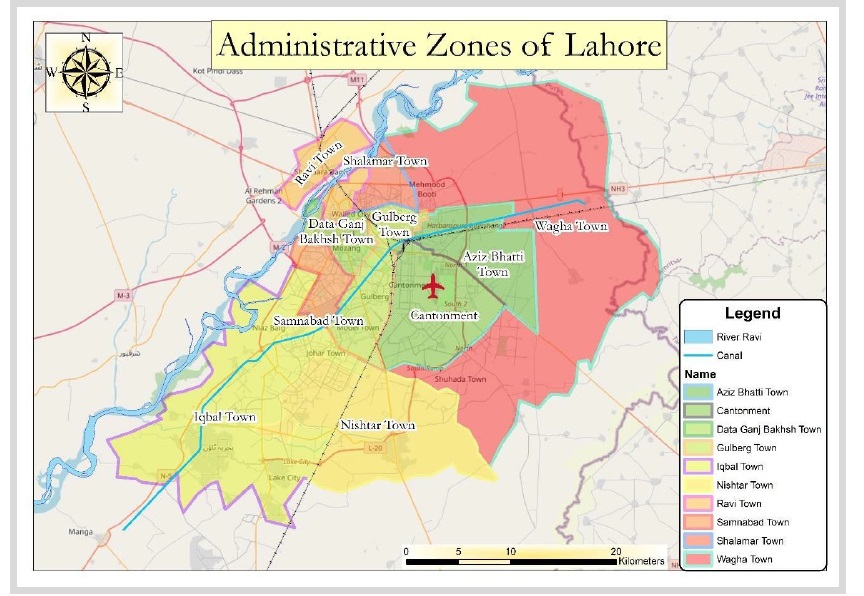Efficient Strategy to Remove Potable Water Scarcity in Lahore
Keywords:
Water recycling, Direct Potable Reuse (DPR), Scarcity, Rainfall harvestingAbstract
Water is life” is not only a phrase but also a reality which ensure human survival. This study provides an important tool to analyze different water management strategies that can be helpful in saving available water resources in an efficient way. Consultation with the public and officials of Water and Sanitation Agency (WASA), Lahore Development Authority (LDA), and Water & Power Development Authority (WAPDA) made this easier to understand the acceptability of the explored strategies in Lahore. A sample size of 400population was observed a supportive method to draw favorable results from the collected primary data. It is estimated that Lahore and its outskirts receive highest rainfall which contributes 40% to the annual groundwater recharge but the water table is still depleting gradually. This research provides necessary information regarding the conservation of ground water. The correlations method was applied to check the significance of the variables. The findings proposed that authorities must communicate awareness among general public regarding importance of water or should start programs for water management. The other way of correlating strategies implemented in other similar countries led us towards billing and taxing as the topmost strategy to be implemented in our case study. A total of 66% targeted population was willing to make this strategy implemented through government support. Although other strategies like flash flooding, water recycling, rainwater harvesting, and equitable access to water all the time were following the acceptance as 60%, 61%, and 62% respectively. Finally, imposition of strict laws on water usage leads toward water saving for a sustainable future.
References
Gillani.S.A, Rehman.S, Ahmad.H.H, Rehman.A, Ali.S, Ahmad.A, Junaid.U, and Ateeq.Z.M Appraisal of Urban Heat Island over Gujranwala and its Environmental Impact Assessment using Satellite Imagery (1995-2016). International Journal of Innovations in Science and Technology, Vol 01 Issue 01: pp 1-14, 2019.
Imran.R.M, Rehman.A, Khan.M.M, Jamil.M.R, Abbas.U, Mahmood. R.S, and Mahmood.S.A, Ehsan. U.H. Delineation of drainage network and estimation of total discharge using Digital elevation Model (DEM). International Journal of Innovations in Science and Technology, Vol 01 Issue 02: pp 50-61, 2019.
Imran.R.M, Rehman.A, Khan.M.M, Jamil.M.R, Abbas.U, Mahmood. R.S, and Mahmood.S.A, Ehsan. U.H. Delineation of drainage network and estimation of total discharge using Digital elevation Model (DEM). International Journal of Innovations in Science and Technology, Vol 01 Issue 02: pp 50-61, 2019.
Fisher-Jeffries, L., Carden, K., Armitage, N. P., & Winter, K. Stormwater harvesting: Improving water security in South Africa's urban areas. South African Journal of Science, Volume 113 issue no.1and 2:pp 8-12,2017
Kanwal, S., H. F.Gabriel, K.Mahmood, R.Ali, A.Haidar, and T.Tehseen. Lahore's Groundwater Depletion-A Review of the Aquifer Susceptibility to Degradation and its Consequences, Technical Journal. University of Engineering and Technology (UET) Taxila, Pakistan. vol 20,issue 1,pp: 26–31,2015
Qureshi, A., and A. H.Sayed. “Situation Analysis of the Water Resources of Lahore: Establishing a Case for Water Stewardship.” WWF Pakistan,2014
Sodhi, I. S. Water Management in India: Emerging issues and challenges. SOCRATES,vol 6 issue 3and 4, pp: 110-127,2018
Samad, M., Water institutional reforms in Sri Lanka, Water Policy, vol 7 issue 1, pp.125- 140, 2005
Lahore’s Groundwater depletion-A Review of the Aquifer Susceptibility to Degradation and Its Consequences.” Technical Journal. University of Engineering and Technology (UET) Taxila, Pakistan. vol 20,issue 1,pp: 26–36,2015
H. F. Gabriel and S. Khan "Policy Options for Sustainable Urban Water Cycle Management in Lahore, Pakistan". Paper presented in ERSEC Water Workshop 2006,ERSEC Workshop on Sustainable Water Management -Problems and Solutions under Water Scarcity, Beijing, China, pp:6-8,2006.
Essa N.D., Amir M., Mahmood S.A., Riaz F., Farooq N., Rasheed R., Fatima S.Q., Batool S., Mehmood S.A., Kaukab I.S. Saeed. F. Analysis of Flood Damage Assessment through WorldView-2, Quick Bird and Multispectral Satellite Imagery in Southern Punjab, Pakistan International Journal of Innovations in Science & Technology, Vol 01 Issue 03: pp 120-139, 2019
Hameed, R., Javed, M., & Nawaz, M. S. An assessment of the adoption of a rainwater harvesting system in residential buildings in Lahore, Pakistan. Urban Water Journal, vol 17 issue 10, pp:1–10,2020
Basharat, M., and S. A. Rizvi. 2011. “Groundwater Extraction and Waste Water Disposal Regulation – Is Lahore Aquifer at stake with Usual Approach?” Pakistan Engineering Congress World Water Day,pp: 135–152., 2011
Naqvi, A. GROUNDWATER LEVELS SUSCEPTIBILITY TO DEGRADATION IN LAHORE METROPOLITAN. Technical Journal. University of Engineering and Technology (UET) Taxila, Pakistan. vol 20,issue 1pp:20-30, 2015
Dr sodhi inderjeet singh, Water Management in India: Emerging Issues and Challenges-Indian Journals, vol 6 issue 3,4,pp:12-15,2020

Published
How to Cite
Issue
Section
License
Copyright (c) 2020 50Sea

This work is licensed under a Creative Commons Attribution 4.0 International License.




















